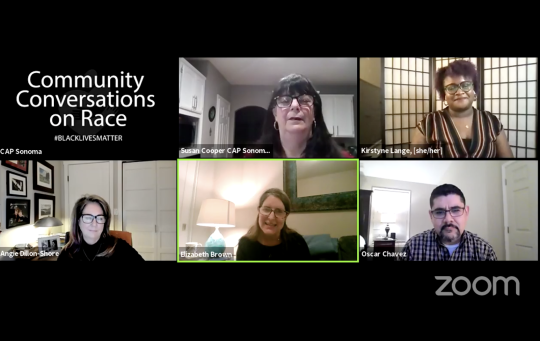Language, Accountability, and Internal Equity
“Words are important, they are powerful, they have consequences,” said panelist Oscar Chavez during a Community Conversation on Race event that focused on topics addressing inequity. This event was hosted by Community Action Partnership of Sonoma County and moderated by Kirstyne Lange.
The panelists for this conversation included; Susan Cooper (CAP Sonoma’s executive director), Elizabeth Brown (CEO of Community Foundations of Sonoma County), Oscar Chavez (Assistant Director of Sonoma County Human Services), and Angie Dillon-Shore (Executive Director at First Five of Sonoma County).
Lange started the conversation by asking the panelists to share their thoughts on the recent attack on the U.S. Capitol. “What I saw was an assault on our country, our democracy, by domestic terrorists…led by a president who launched his campaign on hate. The seeds were planted years ago,” said Chavez.
He then spoke about how this highlights the racial injustice in our nation and the importance of addressing race issues in America. Brown added, “To see for the first time an African American man and a Jewish man be elected to the Georgia senate, but before we could even hold on to that news, to see what happened in the Capitol...I’m in general a hopeful person, but these are dark moments.”
Dillon-Shore mentioned that while she felt joy for the Senate wins in Georgia, she had a sense of foreboding, thinking about how white supremacists may respond. “I think it’s really important to see it for what this really is. That this is just one incident in an ongoing effort to sustain white supremacy, connected to thousands of incidents and systemic oppression over hundreds of years of history...My hope that the shocking nature of the attack on the capitol has woken people up,” said Dillon-Shore. Cooper added, “I also was not surprised about the reaction...There has been such undertones of this racism and anti-semitism.” She then mentioned that, as a Jewish woman, seeing the Auschwitz t-shirts at the Capitol has caused her to lose optimism and hopefulness.
Lange then asked the panelists to discuss their observations on mainstream media and language choice. Chavez spoke to this saying, “There's often a lack of responsibility on people who use divisive words… unfortunately we have seen the damage of what those words have done...Early on people were hesitant or reacted very negatively at calling someone racist...Now I think we're giving ourselves not only the permission to use important words but the legitimacy in using those words.”
I believe all of these statements hit the nail on the head when it comes to how a lot of us feel about the horrific event at the Capitol and the state of our nation in general. In terms of community engagement I think this is a moment in history that forces us to truly reflect on who we are and what our country stands for, and take the appropriate action to correct the trajectory of our nation. Conversations such as this one are a great example of how we can come together to think critically about the flaws in our society and what needs to be done in order to fix those flaws.
This conversation also allowed the opportunity for these local leaders to speak about what their organizations are doing to address racial inequities. Each panelist spoke about how their organizations are making a major effort to address bias and inequities from within, in order to create an equitable community. “Everyone is part of a system.. and you can all be leaders in your system,” said Brown.
Lange closed the conversation by asking the panelists to share about their personal journey towards understanding and addressing inequity. Brown discussed the importance of curiosity saying, “Curiosity, especially as a white person, has to start with questions about your own impact.” Chavez responded by saying, “My approach and my journey is to reach out to the person who has a different perspective and recognize that the truth is somewhere in-between, but the responsibility is for both of us to make a commitment to inch our way toward that truth...Have courage to have that meaningful conversation...It's easy to spew words, it's much more difficult to build relationships and to find commonality.”
These are all extremely important takeaways especially during this time in history. No matter where you are in your journey of community engagement, having these conversations are essential in making progress towards an inclusive and equitable community.
Click here to watch this conversation or here to check out all past Community Conversations on Race.

Author: Stephanie Farris



